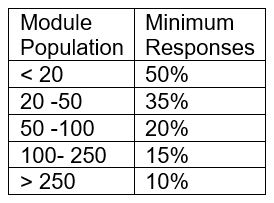Module Evaluation
Each time a module runs, module leaders reflect upon and evaluate the student experience of the module in consultation with the module team. To facilitate this process Schools will have in place a risk-based process for module evaluation, which addresses student performance data from the module and student and External Examiner feedback as well as identify good practice. As part of this process, the module team make sure that any agreed programme level actions are incorporated into the delivery of the module.
The University's regulations relating to module evaluation can be found within the Academic Quality Policies and Regulations UPR AS17 Section C2.
Guidance on Module Evaluation Processes in Schools and in Partner Institutions
Essentials of the module evaluation process
Schools must be able to demonstrate that acceptable systems are in place to ensure that all modules are evaluated by the module team and other key stakeholders. Schools must ensure that appropriate actions are identified, followed through, and monitored for completion. The evaluation must cover the following items:
Must be included
- Module failure rates and performance of different cohorts;
- External Examiner comments;
- Mid-module feedback and SVQ response rates and results;
- Changes to content, assessment and DMDs;
- Teaching and learning issues.
May usefully be included
- Internal moderator comments;
- Module grade profiles by ethnicity and by other student characteristics;
- Canvas site enhancements, including actions following review by technology mentors;
- Physical resources;
- Areas Schools wish module teams to consider to ensure responsivity to new/ emerging issues.
Module evaluation is mandatory and Associate Deans of School (Academic Quality Assurance) must set out the timetable for and ensure that they have appropriate oversight of module evaluation processes. This is typically, although not exclusively, achieved through the use of a school-wide module evaluation form.
Oversight of module evaluation and the role of Programme Committees
The School’s process must make clear with respect to each programme, who is responsible for oversight of module evaluation, how actions are monitored, and how good practice is shared.
Any role that the Programme Committee (PC) has in the oversight of module evaluation, the monitoring of actions and the sharing of good practice should be made explicit. However, It is recognised that the PC role may vary due to the size and complexity of the programme and where modules are shared across programmes.
The role of External Examiners
Whilst there should be no requirement that Module Boards of Examiners are presented with or discuss module evaluations, Schools must have a process in place whereby module teams are required to have a dialogue with the relevant External Examiner about the student experience on the module. This may, for example, involve a meeting with the External Examiner on the day of the Module Board or the Module Evaluation Form may be sent to the External Examiner for comment at some other point when communication with the External Examiner is taking place e.g. the sending of a sample of assessments (if applicable) or assessment briefs.
The relationship between module evaluation and programme monitoring
Module actions should not routinely be included in the CEP action plan. However, where there are common themes across modules contributing to a particular programme e.g. over-assessment, lack of timely feedback etc, the CEP action plan will identify the modules for which the action is applicable. In addition, the CEP Action plan has been modified to include a new section for modules that are identified as being at risk, based on agreed University-wide agreed metrics.
Modules identified as being at risk
Programme Leaders are responsible for identifying modules at risk.
Metrics that will trigger module actions to be included in all relevant programme CEP action plans are one or more of the following:
- Pre- or post-referred/ deferred failure rates above the University thresholds for two or more successive occasions on which the module is delivered;
- Differential outcomes for students falling within certain protected characteristics;
- SVQ responses below the acceptable response rates for more than two successive occasions on which the module is delivered;
- Any other indicators of risk identified by stakeholder feedback.
Some examples of good practice
This guidance recognises that Schools may require some flexibility about how they carry out module evaluation as programme structures vary and size and nature of the programme teaching team may also vary. However, the following are examples of good practice:
- Module planning events/ module review meetings/ programme committee time for programme teams to collectively evaluate modules and share good practice annually or at regular intervals where the actions are explicit;
- The use of SharePoint or MS Forms to make module evaluations and action plans more accessible;
- Regular review or annual consideration by Schools of the areas that they are asking module leaders to engage with to ensure responsivity to new or emerging issues as they arise.







